
by World Moms Blog | Apr 2, 2015 | 2015, Awareness, Being Thankful, Boys, Celebrations, Childhood, Culture, Guest Post, Health, Identity, India, Inspirational, Life, Life Lesson, Milestones, Motherhood, Priorities, Time, World Motherhood, Younger Children
 One moment everything seemed fine and the next I was creating a little puddle of tears on my Yogasana mat.
One moment everything seemed fine and the next I was creating a little puddle of tears on my Yogasana mat.
I emerged from the yogasana pose to find unexpected sobs bursting through my throat, catching me completely unawares. A little part of my mind wondered what this was all about. And then I realized this was probably because of a niggling dissonance within, a reaction to a new milestone in my son’s growth that had not yet been completely accepted or acknowledged. This is what had led to the sudden grey cloud near the heart, that burst through as tears.
This morning, as Abhishek, my son, was having his breakfast before leaving for school, he called out to me saying that there seemed to be a gap between his two lower incisors. I touched a tooth and immediately found it was loose. The milk tooth would soon fall. We grinned and Abhi told me about how Kirti, his school mate, already had two teeth missing. I thought of a couple of his other friends, senior to him by a year, wearing gap-toothed smiles with part-embarrassment, part -pride. Now he would be a part of that gang too.
As we waited at the bus-stop for his school bus, we talked of the concept of the tooth-fairy. We both agreed that the concept was “cute”. I bid him bye, returned home and resumed my morning chores.
But somewhere in the heart, deep, deep down, the unarticulated thought had arrived – our little baby is about to lose his baby teeth. How did the years fly by so fast? And that would have been the genesis of the tears.
The innocence and unsullied grace of childhood are truly magical and seem long-lasting. But the pace of change and growth can actually be so rapid, that the heart can seem overwhelmed. Scarcely does a new milestone–a habit, a skill, or a new activity–set in, than the “Finish” line for that zooms forward, and before one knows it, it is time to say goodbye to yet another phase of one’s child’s growing years.
So much to cherish and so little time! It seems like it was only yesterday that I was rhapsodizing over Abhishek’s four new, shiny little teeth and feeling nostalgic about toothless, gummy smiles. And now it’s time for those very teeth to go!
“So what?”, one may wonder. A purely practical approach to this whole thing would be that his physical growth is going on fine and that I ought to be feeling reassured!
But to me it seems to be much more than that. His shaky little tooth tells me a lot of things. It reminds me that he is growing up quickly and that the only mandate I have been given from the Universe is to give him love, pure and unadulterated, intense and in every moment. It shows me the passage of the seasons of time – the travails of toddler-hood have given way to heart-touchingly earnest attempts at responsibility for this sweet-yet-solemn almost-six-year-old.
But most of all, the tooth reminds me that “this too shall pass!”
So must change be heralded by tears? Not at all. Something tells me that some of the tears were tears of regret, for all those “Not now please, I am busy” moments, when I allowed temporary realities to hijack my energies away from the greater priority of sharing my time and care with him.
Those moments are irretrievable and all I can hope is that this tooth has taught me a valuable learning. And then there were a few tears of concerns: am I ready to guide him right as he reaches a new phase of growth? As ready as I will ever be, I guess.
And then there were tears of joy: my little one, darling creature of the Universe, is growing up.
Motherhood seems like a permanent stage of “Work in Progress”. There is no “Finished Product”, just a heart that smiles, cries, is pulled and stretched and learns to give some more.
This is an original guest post from Piya Mukherjee in Mumbai, India; Mother, Corporate Trainer, Director.
The image used in this post is attributed to Stephanie Sicore of Young@Art. It holds a Flickr Creative Commons attribution license.
World Moms Blog is an award winning website which writes from over 30 countries on the topics of motherhood, culture, human rights and social good. Over 70 international contributors share their stories from around the globe, bonded by the common thread of motherhood and wanting a better world for their children.
World Moms Blog was listed by Forbes Woman as one of the "Best 100 Websites for Women 2012 & 2013" and also called a "must read" by the NY Times Motherlode in 2013. Our Senior Editor in India, Purnima Ramakrishnan, was awarded the BlogHer International Activist Award in 2013.
More Posts

by World Moms Blog | Apr 1, 2015 | Feminism, Girls, Gratefulness, Guest Post, Human Rights, Husband, Priorities, School, Social Equality, Uncategorized, Women's Rights, Working Mother
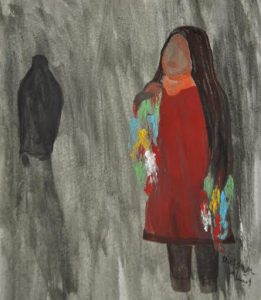 Kids complain about going to school today? Have them read this guest post, which comes to us from Ibtisam in Oman. You can find more of her wonderful perspective on her blog: ibtisammusings.com.
Kids complain about going to school today? Have them read this guest post, which comes to us from Ibtisam in Oman. You can find more of her wonderful perspective on her blog: ibtisammusings.com.
Sometime in the late 1960s, there was a six-year-old girl whose father did not believe education was of any benefit to her. However, because her eldest brother took a stand that education was her right, she went to school and was quite intelligent in her studies. She did not make it to high school, but those first few years meant the world to her.
Fast-forward to 1998. There was 18 year-old girl who just graduated from high school with grades that enabled her to receive a government scholarship to further her studies. She had a dream of studying somewhere abroad. Her father supported her endlessly without having a second thought about it.
Two women, my mother and me, received a life-changing education made possible by the men in our family. In our part of the world, and specially for some women, it was like asking for the moon. The sad thing is, that is still the case for many other women.
In 2010, my husband registered me for a Master’s degree course in business administration. I had two children at that time who were 2 and 4 years old. I had a house to take care of, but he believed I could do it, and I did do it with his full and endless support. He ’empowered’ me to do the course before himself, although it is what he wanted to do for many years.
I worked for ten years at a hospital, then I quit to start my own business. I still can remember one woman I know crying as she wanted so badly to start her business and follow her dream, but her husband gave her a hard time and made it impossible for her.
Initially, the thought of quitting my job scared me to death. Then, the moment that moral support from my husband was there, everything seemed easy. This year, my sister-in-law had an opportunity to work abroad. She found the courage to go for it when her husband, my brother, told her not to worry and that he would support her decision, no matter what it was.
Maybe many will think, ‘how does a man’s decision affect a woman’s choices?’ Well, in my society it does. You can find few girls who managed to follow their dreams despite the resistance they faced. However, this can be so tough and risky in a collectivist society where family ties are sacred.
Maybe we are living the good time for women empowerment in my country and many other countries around us. I hear and read the word ‘woman empowerment’ everywhere in our media. There are conferences, workshops, lectures etc. on this specific issue. This is the reason why I decided to write this. I have this deep feeling of gratitude towards the men in my life, and for men like them who recognize the rights of women. Without their support, love and encouragement, ‘woman empowerment conferences’ would be a story with a sad ending for us.
picture credit: the author
World Moms Blog is an award winning website which writes from over 30 countries on the topics of motherhood, culture, human rights and social good. Over 70 international contributors share their stories from around the globe, bonded by the common thread of motherhood and wanting a better world for their children.
World Moms Blog was listed by Forbes Woman as one of the "Best 100 Websites for Women 2012 & 2013" and also called a "must read" by the NY Times Motherlode in 2013. Our Senior Editor in India, Purnima Ramakrishnan, was awarded the BlogHer International Activist Award in 2013.
More Posts

by World Moms Blog | Mar 20, 2015 | 2015, Awareness, Babies, Being Thankful, Caring, Communication, Eva Fannon, Family, Food, Girl Child, Girls, Gratefulness, Health, Humanity, International, Kids, Motherhood, Older Children, Parenting, Tinne, World Motherhood, Younger Children
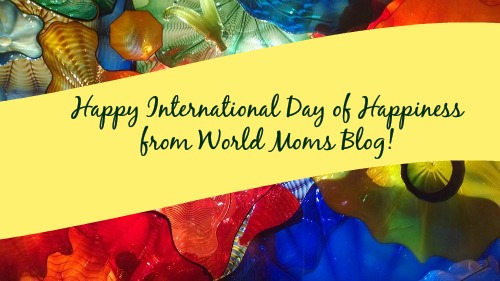 Today is International Day of Happiness! We at World Moms Blog know the importance of connecting with other people. In our technology driven societies, it becomes very easy to send a text message, an email, or to click “Like” on someone’s Facebook status…but does that actually make us feel like we made a personal connection with that person? Truly connecting is not as easy!
Today is International Day of Happiness! We at World Moms Blog know the importance of connecting with other people. In our technology driven societies, it becomes very easy to send a text message, an email, or to click “Like” on someone’s Facebook status…but does that actually make us feel like we made a personal connection with that person? Truly connecting is not as easy!
For International Day of Happiness this year, the theme is focusing on your connections with others. To help you think about conversation starters, or ways to connect with others on a more personal level, we asked our fabulous contributors this question: “What brings you happiness?” Read on to see some of their responses. (more…)
World Moms Blog is an award winning website which writes from over 30 countries on the topics of motherhood, culture, human rights and social good. Over 70 international contributors share their stories from around the globe, bonded by the common thread of motherhood and wanting a better world for their children.
World Moms Blog was listed by Forbes Woman as one of the "Best 100 Websites for Women 2012 & 2013" and also called a "must read" by the NY Times Motherlode in 2013. Our Senior Editor in India, Purnima Ramakrishnan, was awarded the BlogHer International Activist Award in 2013.
More Posts
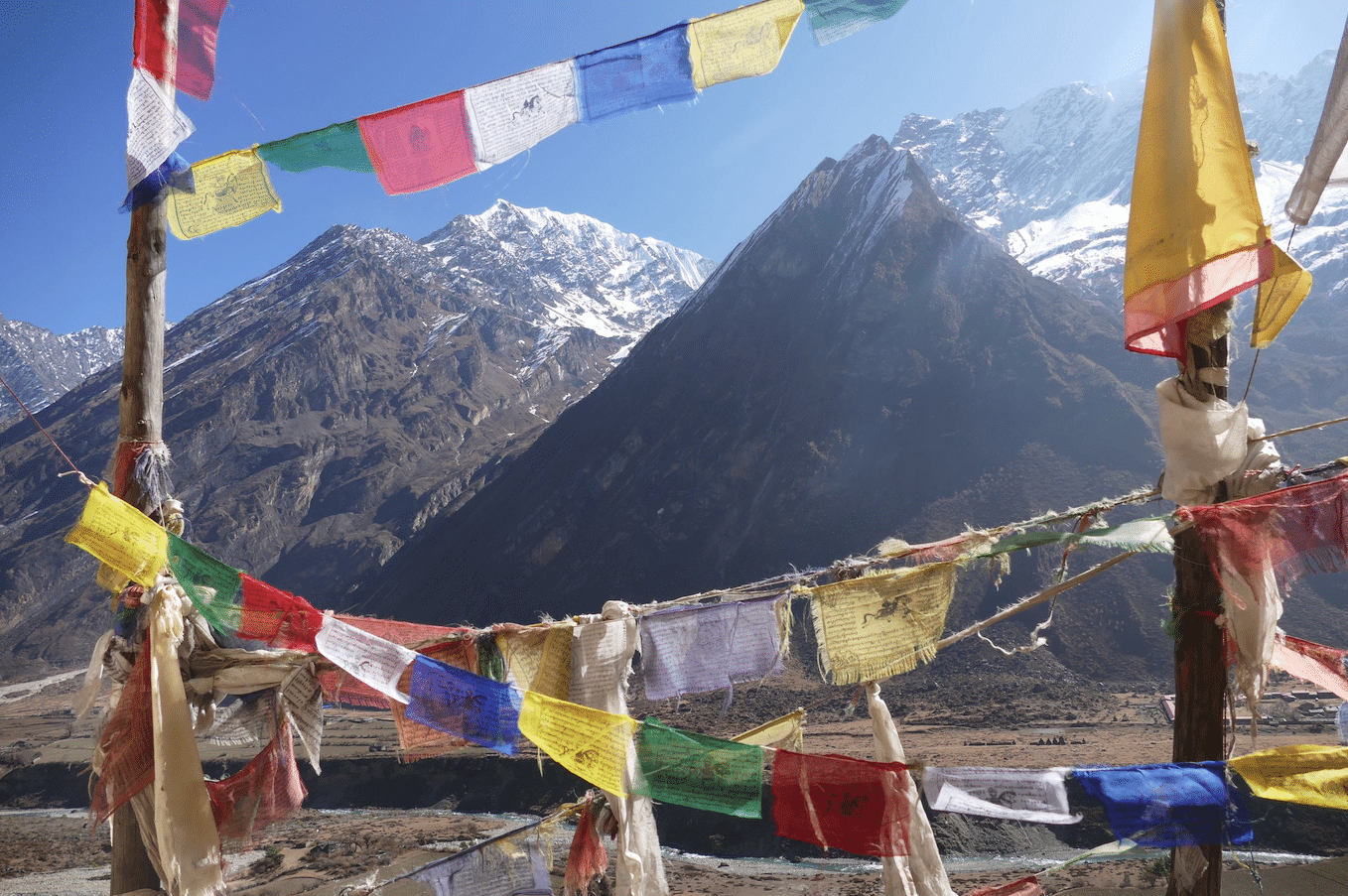
by World Moms Blog | Mar 17, 2015 | 2015, Awareness, Humanitarian, Inspirational, World Moms Blog, World Voice
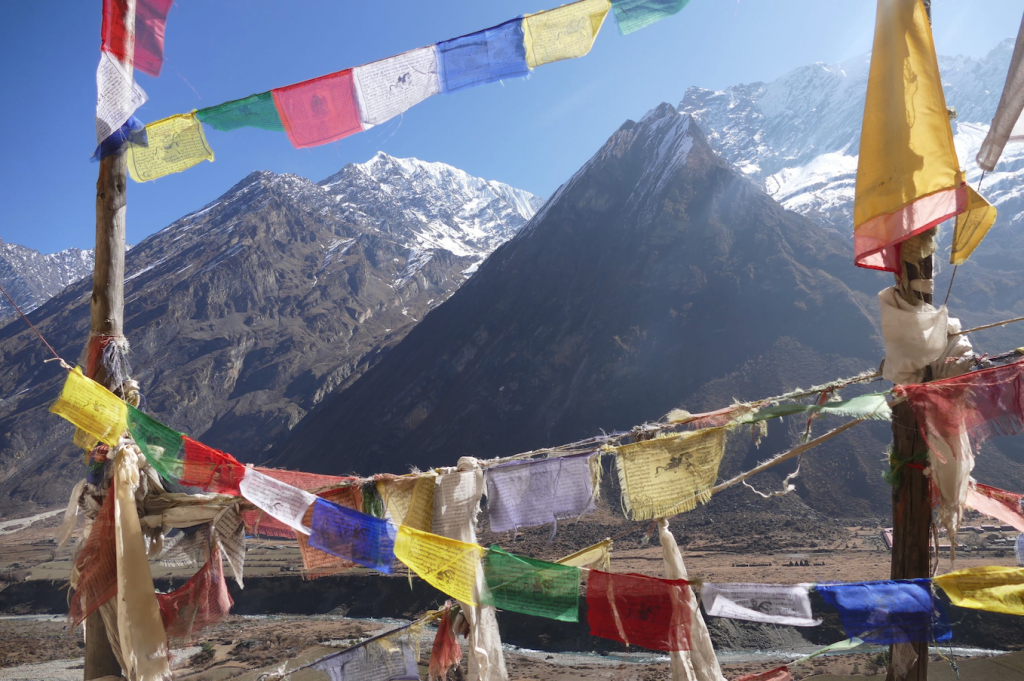
Today our team has returned to the warm embrace of our families in Singapore, but undoubtedly, a piece of our heart was left behind in the sacred Tsum Valley of Nepal, captivated by the thousand smiles we came across during this beautiful and arduous journey. Indeed, Tsum, also known as a beyul or sacred land, had a profound influence on us.
This magical and untouched region of Nepal, one of the most secluded of Himalayan valleys, which only became accessible to tourists in 2008, affected us in ways we don’t yet fully comprehend.
The valley, once part of Tibet, looks completely different in terms of people and culture, from other parts of Nepal. The people of Tsum are Tibetan in origin with their own ancient dialect, art, culture and religion. In addition to the spiritual richness of this expedition, our itinerary was challenging and at times, even a little perilous. It required us to push our physical and mental limits, conquering fears, and dealing with extreme cold and exhaustion, while climbing to increasingly higher altitudes. We gained a total of 4,400 metres of altitude over a distance of 150 kilometres in less than seven days.
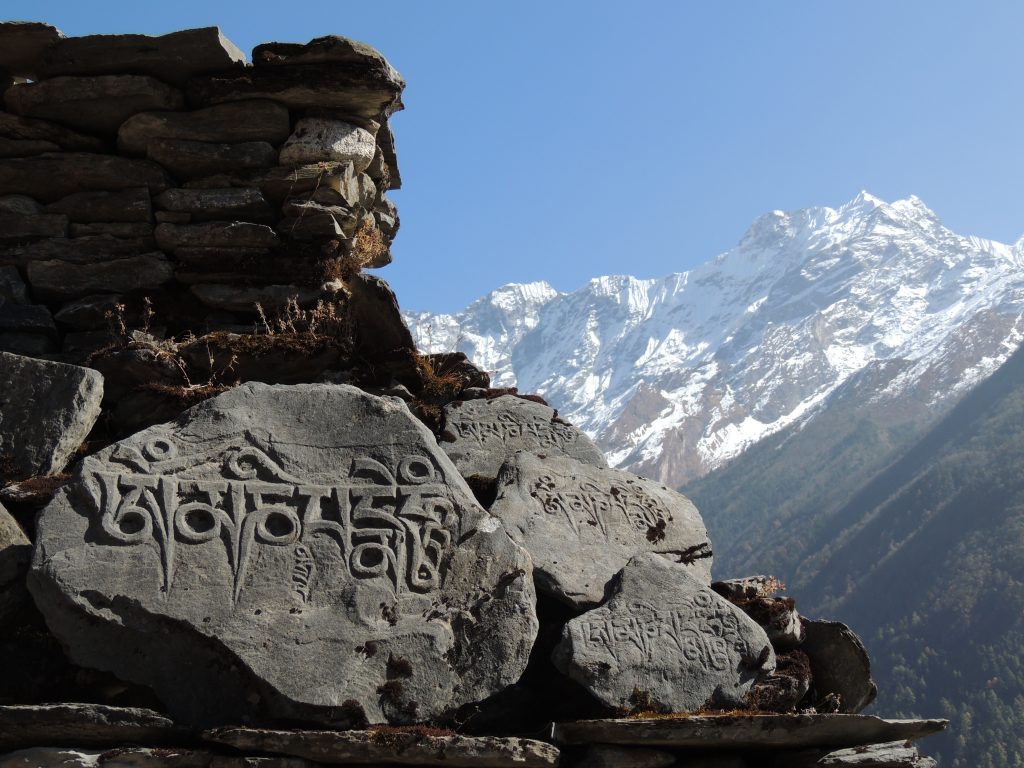
We started in Soti Khola, in the lowlands, visiting sacred caves and secluded villages. As we continued to climb higher, we saw the vegetation and landscape change before our eyes, from thick tropical foliage to lush pine forests. We continued our journey on steep mountainous trails, passing brightly coloured prayer wheels and numerous stupas – little Buddhist shrines. As we gained altitude, the temperatures plummeted, while the landscaped turned moon-like, with a thick blanket of powdery snow covering the peaks surrounding us.
Every day on our journey upwards, we came across caravans of mules and Yaks laden with supplies on their way to and fro Tibet. The people in this region of Nepal have been trading with their Tibetan neighbours for centuries and continue to do so despite the political vagaries affecting Tibet’s status as a nation in relation to the People’s Republic of China.
After an intense week of trekking we reached Mu Gompa (3,700m), where we began a three-day retreat in a century-old monastery. There, we set aside quiet moments in our day for meditation and reflection, as we rested and prepared for our challenging day climb to the Ngula Dhojhyang Pass, perched on the Nepalese-Tibetan border at 5,093m of altitude.
Finally the time came for us to scale the Ngula Dhojhyang Pass. However, because Mu Gompa Monastery is the last place available for trekkers to stay at, past this altitude, if we were to return before dusk, we had to leave no later than 4:30am. An intense 13 to 14-hour climb lay ahead of us.
Luckily the weather had been glorious over the past few days. We were conscious that just a few weeks back, not far from this region, in the Annapurna mountain range, a freak blizzard had just occurred. This unexpected storm arriving in late October, at the peak of the trekking season, had caused the deadliest mountaineering disaster in Nepal’s history. At least 43 people were killed when the blizzard caught them off guard on the trails.
A few other obstacles lay ahead of us on this high pass attempt. For the team to reach that section of the Tibetan border, we had to cross six landslides in total darkness and once again on the way back, ideally while there was still some daylight left.
Nevertheless, our determined team left Mu Gompa Monastery with head torches on at 4:30am in below freezing temperatures. The cold was so intense that the water in our camelbaks remained frozen until 9am. We continued climbing, crossing vast windy plains, traversing numerous icy rivers, scrambling over slippery rocks and small glaciers, and scaling a total of 1,400 metres in one go. Finally at noon, exhausted and cold, but euphoric beyond words, we made it to the Nepalese/Tibetan border at the highest point on the ancient trade route. 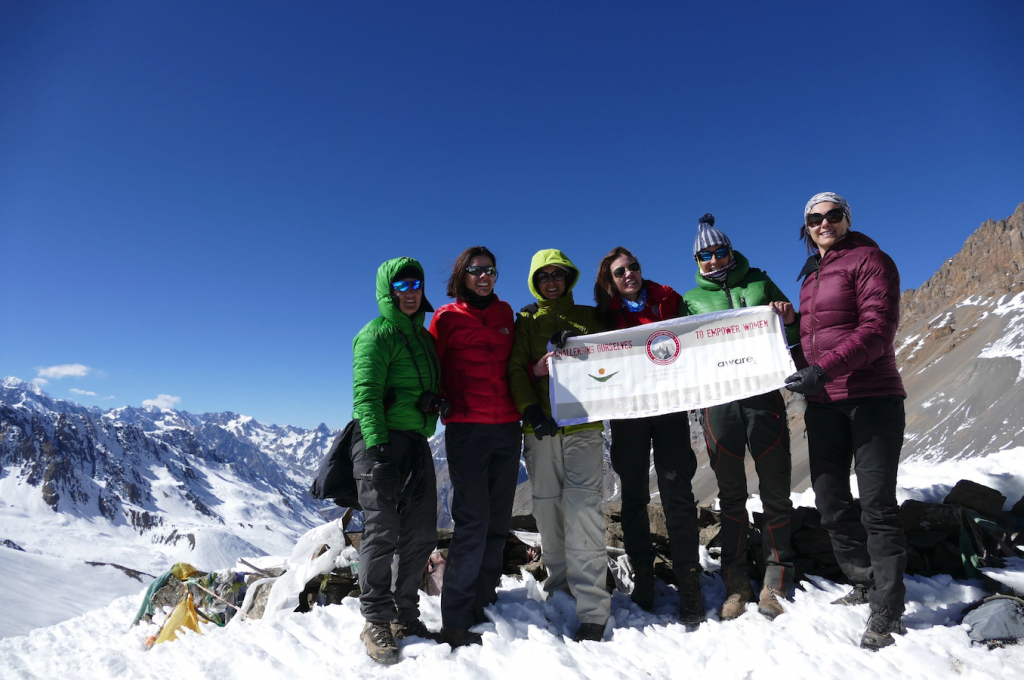
At the top we unfurled a banner reaffirming our commitment to challenge ourselves and empower women around the world.
We stayed 20 minutes on the windy summit, drinking in the stunning views on both sides, and headed straight back down to Mu Gompa, racing to return before dark. Finally 13 hours after our departure, as daylight began to fade, we walked into the monastery’s dining hall completely shattered and drained, but standing tall despite the overwhelming fatigue, with a deep sense of achievement and pride in our hearts.
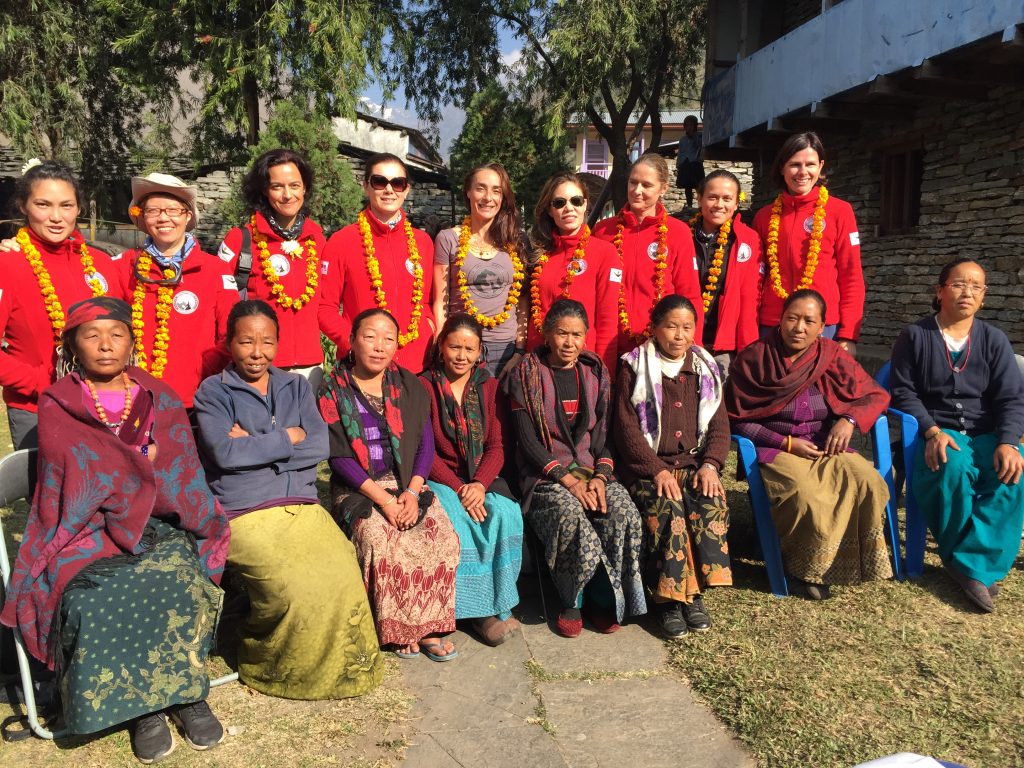
As you can imagine on such a journey, there was much laughter and often tears, of both triumph and frustration, but what we discovered at the end of it all was something far more rewarding. We came to know a people who cherish the simplicity of their lives over any material comfort or possessions. On numerous occasions along the trail, the people of Tsum welcomed us, perfect strangers, into their homes. Their hospitality, kindness and wisdom touched our hearts forever.
Ultimately, we embarked on this journey to support other mothers, daughters, and sisters whose lives have been ripped apart by the horrors of war, women who have been humiliated and raped, robbed of their dignity, whose self-esteem and freedom have been taken away from them. Even if we could never claim to truly understand the suffering they went through, doing something out of the ordinary and dedicating it to these brave women made us feel like we were standing in solidarity with them, and it gave us wings as we climbed higher.
Despite the constant longing for clean toilets, hot running water, warm beds and comfort foods—not the mention the rats we encountered running across our sleeping bags, in the middle of the night in one of the lodges —all the little “hardships” we endured were long forgotten once we were safely back home in Singapore.
It was truly an unforgettable journey in the land of the clouds. From the many multi-coloured prayer flags fluttering in the wind high above our paths, to the beautiful khata – silk scarves – we received as parting gifts, undoubtedly, the beauty of the Tsum Valley will remain alive, etched in our memories forever. No wonder many believe the Himalayas retain a small part of your soul, forever captured and resting peacefully awaiting your return.
Christine Amour-Levar is the Founding Partner of Women on a Mission (WOAM), a non-profit organization that combines challenging, self-funded, expeditions to remote and majestic locations around the world, with inspirational fundraising events, as a means to raise awareness and funds for women victims of violence.
For more information, please visit www.womenmission.com
Or on Facebook: www.facebook.com/WOAMSingapore
This is an original guest post written for World Moms Blog by Christine Amour-Levar.
All photos provided for this post by by Christine Amour-Levar.
Have you ever challenged yourself in such a way as a tribute to others suffering? We’d love to hear your stories!
World Moms Blog is an award winning website which writes from over 30 countries on the topics of motherhood, culture, human rights and social good. Over 70 international contributors share their stories from around the globe, bonded by the common thread of motherhood and wanting a better world for their children.
World Moms Blog was listed by Forbes Woman as one of the "Best 100 Websites for Women 2012 & 2013" and also called a "must read" by the NY Times Motherlode in 2013. Our Senior Editor in India, Purnima Ramakrishnan, was awarded the BlogHer International Activist Award in 2013.
More Posts

by World Moms Blog | Mar 8, 2015 | 2015, World Interviews, World Moms Blog, World Voice
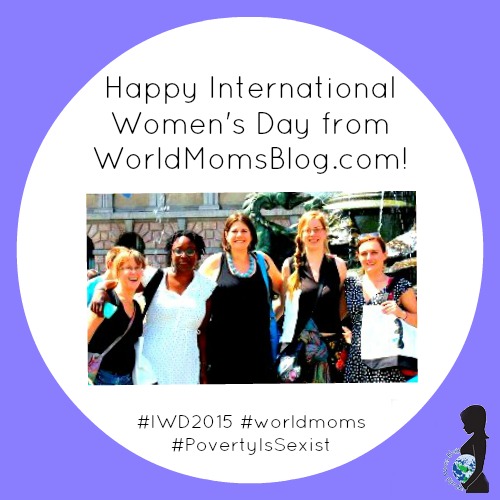
Today is International Women’s Day, also known as Working Women’s Day. To honour women, we, at World Moms Blog are looking at the challenges women face around the world and want to spark a discussion what it means to be a woman in the 22nd century. We also want to use this post as a reminder of how far we’ve come in some places and how much work we still have to do in others.
We asked our fabulous contributors this question: “What are the challenges women face where you live?” and received some thought-provoking, interesting answers.
Maureen Hitipeuw (Indonesia): “Equality. In a country where patriarchy is the ‘norm’ women are still being treated as second class citizen at times and that our place is at home, raising kids, cooking. Slowly this starts to shift, and I am happy to see the changes, but I am also very concerned about the support single mothers get here. Single fathers are deemed as ‘strong hero’ while single mothers still bear the negative stigma. Happy International Women’s Day!”
Mirjam Rose (The Netherlands): “I think it is balancing kids and work in the Netherlands . Although many fathers are willing to participate in taking care of their children, the work culture makes it difficult. Most bosses still expect that men simply come to work while their wives take care of the children. And because childcare has become increasingly difficult and expensive, more women are quitting their jobs or are working part-time, making it hard to pursue any career. At the same time the government expects women to work more.”
Kirsten Doyle (Canada): “In Canada, there is still wage inequality between men and women, and women are very poorly represented in the political arena. Another big challenge that isn’t spoken of often enough is how victims of rape are treated. We live in a blame-the-victim society that is hard to fight.”
Carol (Canada): “Another Canadian problem is our missing Aboriginal women. There is a lot of institutionalized racism in Canada regarding our native peoples, and we currently have an epidemic of native girls and women who have been murdered or have gone missing, without the police/authorities exerting much effort to find them or their killers. In the most worrying example, a serial killer managed to get away with killing probably 50 women over a decade period, and the police ignored it because the women he killed were all aboriginal or transient. But because several of the witnesses were also transient/aboriginal women, including the woman who claimed to be attacked, they weren’t taken seriously.”
Aisha Yesefu (Nigeria): “From birth the woman in my country faces discrimination. Some men have beaten their wives for giving birth to girls. Others have simply abandoned their wives at hospital for giving birth to girls. Sometimes there are tears because IT’S A GIRL. In terms of education the woman is given less chance to be in school. Discriminated upon even in her home. She has to do the whole house work while her male counterpart has time to read.
Women are not allowed to do certain jobs in my country. In some parts of my country women cannot own landed properties. They cannot inherit properties even from their husband. Women in some parts, too, are forced to go through dehumanising situations when their husband’s die like drinking the water used to wash the corpse to prove they have no hand in the death of husband.”
Nicole Morgan (USA): “The glass ceiling is not invisible. Dads being applauded for parenting, ummm Hello. Watching your children is NOT babysitting. Women fielding a myriad of responsibilities remains the usual, men stepping up to responsibility is not outside of the box, but part of being a dad!”
Olga Mecking (The Netherlands): “The Netherlands is a great place for women. The fathers are very involved, the support network is huge (daycares, for example) however even then there are challenges. For example, I believe there should be a bigger spectrum of birthing choices (not restricted to natural childbirth or homebirth). While it may seem that Dutch women found their work/life balance, the truth is that they are encouraged to work part-time- not too much, not too little. Again, this may be great for some, it is not enough for others. Also, Dutch women are still expected to do the majority of household and parenting chores. And, with government cutting down on daycare allowances, more and more women decide to stay at home rather than work.”

Jennifer Burden (USA): “Equal pay is still a huge issue that affects women in my country — studies indicate that women are paid less for the same jobs as their male colleagues. Also, our maternity leave is comparatively small — 12 weeks, and it is not necessarily paid, depending on the employer. I’d like to see these changes when it comes to my daughters’ future! I also want to add healthcare — there are still women who are uninsured or underinsured in the country. And more support for programs for moms who are living below the poverty line.”
Karyn (New Zealand): “For us there is a difference between those in poverty who have a whole raft of challenges to meet, just in order to get enough food and decent housing for their children, around 25% of all New Zealand children live below the poverty line. For those who have access to more money, it’s the pressure to be everything to everyone. Especially with us lot who had our children late and are often dealing with teenagers and aging parents at a time when our careers may be also at their peak.”
Elizabeth Atalay (USA): “In the U.S., we have wage disparity, some of the lowest numbers of women in government leadership positions in the world, and major childcare issues for working mothers.”
Sarah Hughes (USA): “To play off what Elizabeth just said, I think one of the biggest challenges in the US is being a working mother. Finding reliable, safe, engaging and good childcare is so hard. We pay in childcare more than most people pay in rent/mortgage per month. I have no idea how the average family can afford it. It’s a huge financial stress on our family which then turns into emotional stress, too!”
Adwoa Gyimah (Ghana): “Access to proper healthcare for the needy is a challenge in Ghana. There are systems in place to ensure that most, if not all, pregnant women get free healthcare access, but there are lapses that makes it challenging in some parts of the country, especially in the rural areas and even some urban areas. The country has come a long way in ensuring that all children of school going age can have free basic education, but there are still children on the streets selling or helping on family farmlands to earn some income to support their families.”
Nicole Melancon (USA): “I would say more opportunities for women who want to have a career and raise a family. I feel like it is all or nothing in our country.”
Also, one of our partners, the ONE Campaign, released a new campaign called “Poverty is Sexist” today! If you do one thing today, check out ONE’s new #PovertyIsSexist campaign: .
What about you, dear readers? What challenges do women face in you part of the world? Please tell us in the comments!
This is a collaborative post organized by World Mom contributor, Olga Mecking, The European Mama. Thank you, Olga!
Image credits to World Moms Blog and The European Mama.
World Moms Blog is an award winning website which writes from over 30 countries on the topics of motherhood, culture, human rights and social good. Over 70 international contributors share their stories from around the globe, bonded by the common thread of motherhood and wanting a better world for their children.
World Moms Blog was listed by Forbes Woman as one of the "Best 100 Websites for Women 2012 & 2013" and also called a "must read" by the NY Times Motherlode in 2013. Our Senior Editor in India, Purnima Ramakrishnan, was awarded the BlogHer International Activist Award in 2013.
More Posts

 One moment everything seemed fine and the next I was creating a little puddle of tears on my Yogasana mat.
One moment everything seemed fine and the next I was creating a little puddle of tears on my Yogasana mat.



 Today is
Today is 










